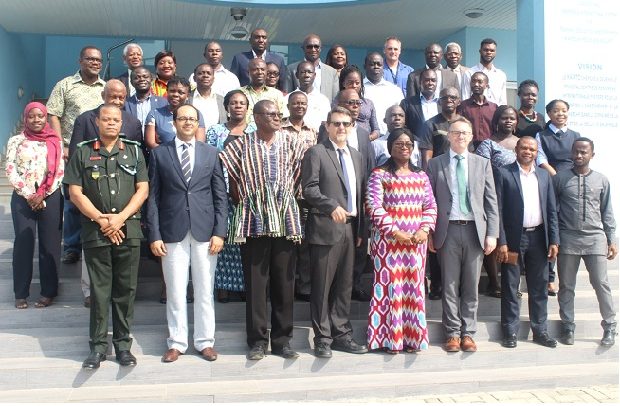The participants of the report launch in a group photographO
A substantial overhaul of the regulatory, legal, enforcement and education system around African medical supply chains has been recommended for the fight against counterfeit pharmaceuticals in the continent.
The above action forms part of the empirically informed recommendations of the study, ‘The Rise of Counterfeit Pharmaceuticals In Africa’, aimed at helping African countries fight the rise of counterfeit pharmaceutical products in the region.
The findings of the study published as a policy brief also called for the legal and regulatory frameworks for combating medicine fraud to be enacted and established nationally, as well as a consistent and regular assessment of counterfeits to be undertaken and awareness and training campaigns improved.
“Options to introduce mass-serialisation forms of track-and-trace should be investigated and evaluated and supply chains will need to be carefully assessed to identify risk areas,” suggested the study that investigated the dynamics of the problem of counterfeit medicines in Africa- including its causes, drivers, impact and implied policy challenges.
The study was conducted by enhancing Africa’s response to transnational organised crime (ENACT), one of the European Union (EU)-funded projects under its Pan-African programme support agenda.
Eric Pelser, the ENACT programme head of the Institute for Security Studies, who spoke at the launch of the report, said the Sustainable Development Goal (SDG) 3 places significant emphasis on populations’ health, with its sub-target 3.8, specifying access to safe, effective, quality and affordable essential medicines and vaccines for all.
“Yet, remarkably missing from the discourse around achieving this goal is the need to address the growing phenomenon of counterfeit medicines, which disproportionately affects developing countries,” he stated.
Mr. Pelser mentioned that the growing incidence of the so-called falsified and substandard medical products was arguably the most insidious and evil form of illegal trade which leads to widespread loss of lives, accounting for between 64,000 and 158,000 otherwise avoidable deaths annually from malaria alone in sub-Saharan Africa.
The Director of Pharmaceutical Services at the Ministry of Health (MoH), Martha Gyansa-Ludtterodt, and also chief pharmacist, urged all stakeholders to form a united front to fight against the proliferation of these counterfeit pharmaceuticals on the Ghanaian market.
Ghana, she said, is currently re-engineering her supply chain mechanism to make it responsive to current challenges both at the national, regional and global level, citing the Executive Instruments, the Act 167 which bans the importation and use of all codeine content in cough syrups, and the Act 168 criminalising the use of tramadol drug with active ingredients higher than 50 to 100 milligrams, saying these medicines must be obtained strictly with prescriptions only.
By Jamila Akweley Okertchiri


